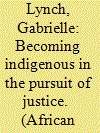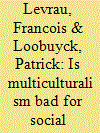| Srl | Item |
| 1 |
ID:
110890


|
|
|
|
|
| Publication |
2012.
|
| Summary/Abstract |
The February 2010 ruling of the African Commission on Human and Peoples' Rights on the Kenyan government's violation of the Endorois people's rights is the Commission's most substantive and radical decision to date, with important implications for international jurisprudence, national politics, and local strategies - as well as potential socio-economic realities and inter-communal relations. The ruling combined a liberal interpretation of the African Charter with far-reaching recommendations and the request for a government progress report. It was the first time that the Commission had decided on and extended individual and peoples' rights to indigenous people, and is the first time in the world that a specific right to development has been adjudicated upon. By accepting the Endorois as an indigenous community the decision completes a process of ethnic invention that began in the 1990s, and has seen Endorois assert ethnic difference from their Kalenjin neighbours as a strategy of legal argument. The outcome is a victory for Endorois leaders and may help other communities tackle state injustice. However, the broad implications for social justice and inter-communal relations are contentious given the decision's reinforcement of an inherently exclusive sense of ethnic territoriality and neglect of gross inequalities in wealth and power. From this perspective, the decision reflects a modern obsession with the 'politics of recognition' to the neglect of a 'politics of redistribution'.
|
|
|
|
|
|
|
|
|
|
|
|
|
|
|
|
| 2 |
ID:
122471


|
|
|
|
|
| Publication |
2013.
|
| Summary/Abstract |
Multiculturalism as an official policy strategy has recently come in for significant criticism in a number of Western European countries. A key criticism is that multicultural policies undermine redistribution policies, since they would erode the social cohesion upon which redistribution measures are built. However, empirical research does not univocally confirm this critique. This article explains why this is the case. The first argument is called the integration-recognition paradox. Policies that focus on recognising minority groups may lead to a greater social acceptance of those minorities, and in turn may lead to their feeling more appreciated as participants in society. In a second argument, the authors discuss how multicultural policies could easily be combined with policies that invest in national unity and social cohesion.
|
|
|
|
|
|
|
|
|
|
|
|
|
|
|
|
| 3 |
ID:
110532


|
|
|
|
|
| Publication |
2011.
|
| Summary/Abstract |
Against the current consensus among comparative political economists, we argue that inequality matters for redistributive politics in advanced capitalist societies, but it is the structure of inequality, not the level of inequality, that matters. Our theory posits that middle-income voters will be inclined to ally with low-income voters and support redistributive policies when the distance between the middle and the poor is small relative to the distance between the middle and the rich. We test this proposition with data from 15 to 18 advanced democracies and find that both redistribution and nonelderly social spending increase as the dispersion of earnings in the upper half of the distribution increases relative to the dispersion of earnings in the lower half of the distribution. In addition, we present survey evidence on preferences for redistribution among middle-income voters that is consistent with our theory and regression results indicating that left parties are more likely to participate in government when the structure of inequality is characterized by skew.
|
|
|
|
|
|
|
|
|
|
|
|
|
|
|
|